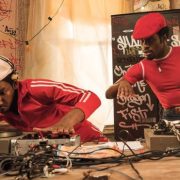When I was in the fifth grade, my public school in Orange County, California attempted to teach us a lesson about why we need rules. And what the faculty had hoped would end in chaos actually turned out to be a perfect example of emergent order.
Each day after the students had finished their lunches, we were permitted to play on the playground. For those who didn’t want to use the playground equipment or sit and talk with friends, we also had the option to go play soccer on the field.
Orange County is a haven for soccer players. Almost all of my friends belonged to a team and spent their weekends and after school hours training. I, on the other hand, was not born with the skills of an athlete, so I avoided soccer like the plague.
On one spring afternoon, the adults who were responsible for watching the students during recess asked us to huddle around them for an announcement. Today, they were going to try something new. The usually heavily regulated soccer field would be free from rules for one afternoon.
The students erupted in loud cheers. Our lives were constantly being dictated by rules adults set for us. Most of the time, we didn’t understand what these rules were trying to protect. But we obeyed because to disregard the rules meant punishment.
The Great Soccer Experiment
Hundreds of children ran for the field, anxious to live out this dream of soccer anarchy. As someone with little interest in sports, but a great interest in observing human action, I took myself to the outskirts of the field where I could watch from a safe distance.
Since soccer was a major component of many of these students’ lives, there was no real chaos in the beginning. Students selected their team captains and begin to split up into teams. The only real difference between this day and any other day was the fact that students were permitted to talk and laugh while doing so. Usually, any attempt at small talk during the team selection would warrant a whistle being blown in your face as the adults reminded you to be quiet.
But oddly enough, in the absence of the whistle, things still went smoothly and quickly. The students knew that recess time was limited, they wanted to get on the field and start playing just as much as the adults in charge wanted to control our behavior.
After the teams were selected the real test began: Could a bunch of elementary school students play “lawless soccer” without killing each other? And as it turned out, they could.
I remember standing on the sidelines, waiting for chaos to breakout but instead, noticing how polite and cordial things were. As it turned out, when my classmates were left to their own devices, without fear of having the authoritarian whistle blown in their direction, they were happier because they were free. But this did not bode well for the school’s administration.
After twenty minutes of incident-free playtime, the whistles were back and the students were being rounded up.
The adult on duty cried, “This was a disaster!” All the students looked at each other in surprise. Had we missed something? Was there some bloody student sitting in some corner after being trampled?
“See what happens when there are no rules? This is why you need to trust in the adults to make set guidelines that will keep you safe.”
Again, we all sat perplexed wondering what had just happened. As someone who was not actually playing soccer, I had been watching the entire time. The only difference between today and any other day was the fact that my classmates seemed genuinely happy, instead of constantly looking over their shoulder worrying that an adult would yell at them.
This entire debacle warranted an assembly in which the adults were praised for thinking of such a brilliant lesson to teach us about why rules were needed. All the while, me and my classmates sat utterly confused as to what had really happened. But being accustomed to the “adults always know best” rhetoric, we simply shrugged this off and assumed we had missed something.
What Really Happened on the Field?
I have never been able to fully forget this incident. Even as an adult it has bothered me. The supposedly lawless soccer field was not chaotic at all. It wasn’t until I began studying free market economics that I realized what had really happened on the soccer field that day.
Like all humans, young and old, my classmates were fueled by one of the most powerful motivators of all time: self-interest. Since so many of them were soccer players outside of school, they cared a great deal about the sport. Lunchtime soccer was just another chance to practice their skills and improve. They had no interest in wasting this time. But there is even more to it than that.
The adults had expected the soccer field to turn into a Lord of the Flies fiasco simply because it could. But that never happened. Even as young children we knew enough about life to know that we wanted to avoid getting hurt, which also meant avoiding hurting others. For those who did belong to a soccer team, which was the majority of the students on the field that day, an injury would mean they might have to potentially miss their next soccer game.
On that same train of thought, any attempt to hurt another student would not help you when it came to social capital. No one wants to be friends with a bully. If a student had gone on a rampage and attempted to hurt other players, no one would want him or her on their team. And since we were all stuck together for 12 years of compulsory education, it was not in anyone’s best interest to ruin it for everyone else. Self-interest is a great incentive.
This led to an unspoken understanding on the field: You don’t intentionally hurt me and I won’t intentionally hurt you.
Spontaneous Market Order
This same lesson translates to the market. There is a belief that without rules, all market producers would be trying to poison the food they sell or hurt consumers with their products in some other way. But this rarely happens. Why? Because consumers need the producers and the producers need consumers. To inflict pain or inconvenience on each other would serve no one. This understanding is, in itself, an organic law that keeps the market working for all its players.
When the government gets involved and places unnecessary restriction on the market, they do little more than act like the adults with whistles on the playground, making everyone uncomfortable for no real reason. But even worse, sometimes those in charge partner with producers and protect bad behavior.
When the state gets in the business of protecting certain industries, it disrupts natural responses. Government sanctioned monopolies, for example, are allowed to do whatever they want without responding to consumer feedback, because they have the backing of the state. In truly free markets, consumers could shun a company with bad practices, just like school children could shun a bully acting rudely on the soccer field.
But protecting certain businesses is akin to a school bully being given the authority to hurt other students on the field, with the assurance that the faculty would still force other students to interact with them. This seems outrageous, but it happens all the time. Think of utility companies that enjoy partnerships with local governments. If you are dissatisfied with your gas company, you cannot just switch to another.
When humans are left to their own devices amazing things happen. We need to trust in our ability to work together without government interference, just like my classmates trusted their ability to play a soccer without ushering in the end of the world.













